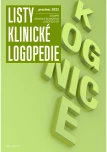EDITORIAL
Published in:
Listy klinické logopedie 2022; 6(2): 3
Category:
Editorial
Dear readers,
Welcome to the twelfth issue of the Clinical Speech Therapy magazine, LKL. The photo and cover text have no doubt set the scene for this issue’s prime focus. Our theme is cognition, and cognitive-communicative disorders in particular. Like the Christmas cookies many are now preparing and surreptitiously sampling, our cognition is truly delicate and fragile and, as we all note with some chagrin and apprehension – our cognitive capacity does not improve with age. Modern technology can help us with some of the pitfalls; memory problems are alleviated by online search engines that swiftly recall what we have long forgotten, while our spatial orientation is aided by sat-nav apps that tell us not only where and when to turn, but also where, what and sometimes even who we might bump into along the way. Yet formulating ideas in spoken and written language can remain a struggle. Even the most modern translation engines cannot exactly capture what we intended. Recent months have shown how topical it can become for us to understand a language we never thought we’d need. War has brought new challenges to our lives. How can we understand what another person is saying, when the most unequivocal statements they make get transformed by even the best online translation engines into something incomprehensible, often almost surreal? Some of us have in recent months been advised to buy a ‘notebook in a box’ (instead of a squared-paper pocketbook) or told that people ‘lift mushrooms’ (which they pick), or that they are ‘inland’ (when outdoors, in the countryside). We can still make sense of those phrases, with some deduction, thanks to our intuition, context, and theories of mind. But have you ever tried asking artificial intelligence to translate poetry? The charming verse of William Henry Davies “What is this life if, full of care, we have no time to stand and stare.”, i.e. ‘What value has life without time for leisure?’ can be transformed by artificial intelligence into ‘What kind of life is it to be busy in a care home.’ Do you want more time to care less?
We need to stay ‘with it’ and keep our own cognitive functions and those of our patients and loved ones as fit as possible for as long as we can. The apparent shortcomings and gaps in our mental function are (fortunately?) still very far from being refillable by artificial alternatives.
In this issue, do have a good read about neglect syndrome, primary progressive aphasia, speech understanding, the risk factors of dementia and, – like us, do marvel at the complexity and beauty of the human mind.
May the delicate intricacy of Christmas cookies, but especially of our minds and hearts be our inspiring challenge, never a lost cause to give up on!
All the best for the New Year on behalf of the entire LKL editorial board,
from Zuzana Lebedová
Labels
Clinical speech therapy General practitioner for children and adolescentsArticle was published in
Clinical speech therapy (Listy klinické logopedie)

2022 Issue 2
- Hope Awakens with Early Diagnosis of Parkinson's Disease Based on Skin Odor
- What Effect Can Be Expected from Limosilactobacillus reuteri in Mucositis and Peri-Implantitis?
- Deep stimulation of the globus pallidus improved clinical symptoms in a patient with refractory parkinsonism and genetic mutation
- The Importance of Limosilactobacillus reuteri in Administration to Diabetics with Gingivitis
-
All articles in this issue
- EDITORIAL
- SPEECH/LANGUAGE COMPREHENSION IN THE CONTEXT OF LANGUAGE DIFFICULTIES IN PERSONS WITH NEUROCOGNITIVE DISORDERS
- THERAPY OF PRIMARY PROGRESSIVE APHASIA IN CURRENT RESEARCH
- SENTENCE COMPREHENSION IN A PATIENT WITH MILD COGNITIVE IMPAIRMENT OF THE AMNESTIC TYPE: A CASE REPORT
- OVERVIEW OF RISK FACTORS FOR DEMENTIA
- SPATIAL NEGLECT IN STROKE PATIENTS
- PATIENT WITH ACQUIRED SPEECH DISORDER IN CLINICAL NEUROPSYCHOLOGY PRACTICE, A CASE STUDY
- ODKAZY NA ZAJÍMAVÉ ZÁVĚREČNÉ PRÁCE S TEMATIKOU KOGNITIVNĚ-KOMUNIKAČNÍCH PORUCH
- BRIEF CHILDREN’S DICTIONARY QUESTIONNAIRE SDDS 16-42: INTRODUCING A SCREENING DIAGNOSTIC TOOL FOR EARLY DETECTION OF CHILDREN WITH DELAY IN THEIR LANGUAGE SKILLS’ DEVELOPMENT
- SOCIAL (PRAGMATIC) COMMUNICATION DISORDER
- Self-stigma in stuttering – a preliminary study using the Polish adaptation of the Stuttering Perception Scale
- RECENZE DIAGNOSTICKÉHO MATERIÁLU TEPO – TEST POROZUMĚNÍ VĚTÁM
- RECENZE KNIHY DEMENCE: HODNOTICÍ TECHNIKY A NÁSTROJE
- STIMULUJÚCE A PODPORUJÚCE PROSTREDIE JE AZDA NAJDÔLEŽITEJŠIE PRE ZAČÍNAJÚCEHO ODBORNÍKA ROZHOVOR S PROF. ZSOLTEM CSÉFALVAYEM
- Clinical speech therapy (Listy klinické logopedie)
- Journal archive
- Current issue
- About the journal
Most read in this issue
- SOCIAL (PRAGMATIC) COMMUNICATION DISORDER
- OVERVIEW OF RISK FACTORS FOR DEMENTIA
- RECENZE DIAGNOSTICKÉHO MATERIÁLU TEPO – TEST POROZUMĚNÍ VĚTÁM
- BRIEF CHILDREN’S DICTIONARY QUESTIONNAIRE SDDS 16-42: INTRODUCING A SCREENING DIAGNOSTIC TOOL FOR EARLY DETECTION OF CHILDREN WITH DELAY IN THEIR LANGUAGE SKILLS’ DEVELOPMENT

